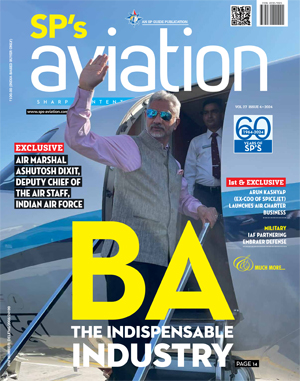INDIAN ARMED FORCES CHIEFS ON
OUR RELENTLESS AND FOCUSED PUBLISHING EFFORTS

SP Guide Publications puts forth a well compiled articulation of issues, pursuits and accomplishments of the Indian Army, over the years

I am confident that SP Guide Publications would continue to inform, inspire and influence.

My compliments to SP Guide Publications for informative and credible reportage on contemporary aerospace issues over the past six decades.
Unsustainable High ATF Prices

Oil companies such as Indian Oil Corporation; Hindustan Petroleum and Bharat Petroleum are worried about their mounting losses, selling petrol, diesel, domestic LPG and kerosene way below their production cost, thus ruling out selling ATF at subsidised prices
As on April 1, 2011, the price of aviation turbine fuel (ATF) in Delhi was Rs. 59,157 per kilolitre, up from Rs. 40,728 in October 2010. That is a whopping 30 per cent plus increase. And in the last six months, ATF price has gone north about a dozen times, continuing to squeeze airline profitability and bleeding them further.
As per the Economic Survey 2010-11, tabled by the Finance Minister Pranab Mukherjee in Parliament, high jet fuel prices will dampen the aviation sector. ATF accounts for 40 per cent of the operating cost of Indian carriers as against about 20 per cent for international airlines. Oil companies have been urging the government to reduce customs or import duty on crude oil from five per cent to zero, but the government has ignored the plea.
“There is a severe risk of dampening of passenger market growth by quickly making air travel out of reach for a significant portion of the market, which was fuelling its growth,” the survey said.
ATF prices in India have always been much higher than in South East Asia and the Middle East and analysts estimate it to be over 60 per cent higher, due to high taxation and duties. The basket of crude oil that India buys averaged $110.66 ( Rs. 4,980) per barrel in March. There is not going to be any let-up in the upward movement as the crisis in the Middle East and North Africa are yet to be resolved. Meanwhile, the International Air Transport Association (IATA) has indicated that for 2011 the average fuel price would be $122 ( Rs. 5,490) per barrel, impacting the airlines with additional outgo of $52 billion ( Rs. 2,34,000 crore) on the fuel bill alone. The consolation, if at all, is that the price is well below the 2008 peak of $180 ( Rs. 8,100) per barrel.
ATF as ‘declared goods’
At present in India, the government levies an excise duty of eight per cent on ATF fuel and this is compounded by various state governments imposing value added tax (VAT) ranging from 20 to 30 per cent. Adding to the woes of the airlines has been the uncertain crude prices and the industry has been demanding that ATF be accorded ‘declared goods’ status, thus reducing the applicable VAT to four per cent or lower. The levies have resulted in the final selling price of ATF going up by nearly 50 per cent from the base price, whereas in Dubai, Singapore and Malaysia, it has been reported that the price is only one per cent higher than the base price.
Such regular hikes are passed on to the passengers and there are fears that passenger growth may get adversely affected. With profitability of airlines suffering, they have been trying to offset the same by passing it on to the passengers. “Kingfisher Airlines has sufficiently raised the fuel surcharge to meet the rising crude expenses,” Chairman Vijay Mallya has said.
The case is so with other operators too. “We have not raised the fares but we have adjusted the fuel surcharge. We are forced to pass it on to the passengers as increasing fuel prices have squeezed our margins,” said Sudheer Raghavan, Chief Commercial Officer of Jet Airways.
The low-cost carriers (LCCs) are in a much worse of spot on this. SpiceJet CEO Neil Raymond Mills has termed the high ATF prices as “unsustainable” for the survival of airlines. “We have already started passing the ATF burden on to the customer. We have started with an increase of a couple of hundred rupees per ticket. But to be very honest, this is only the beginning. It is getting really uncomfortable,” he said.





